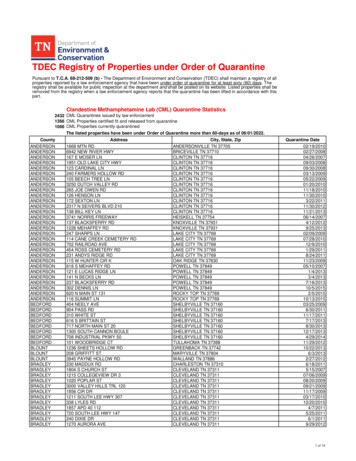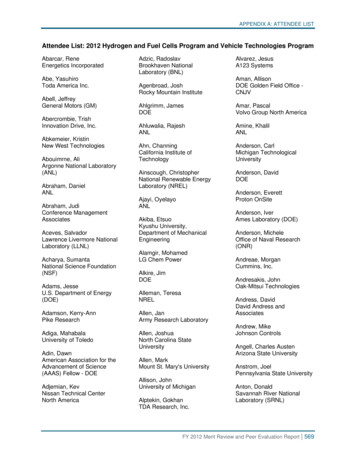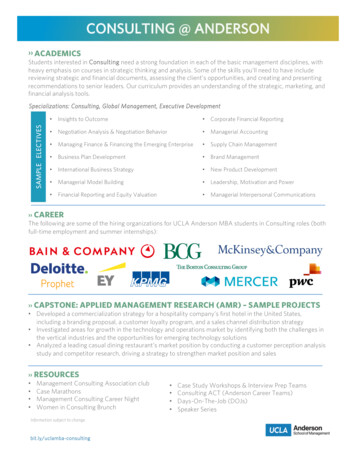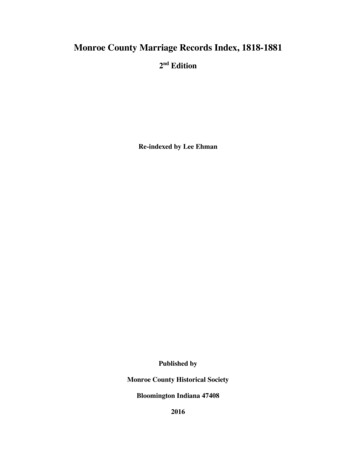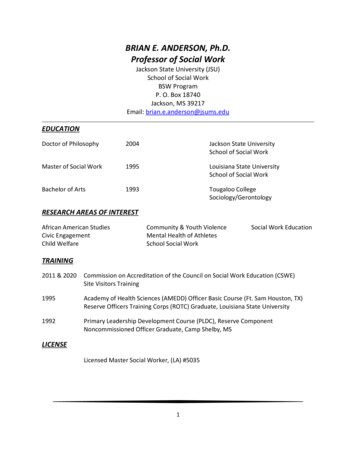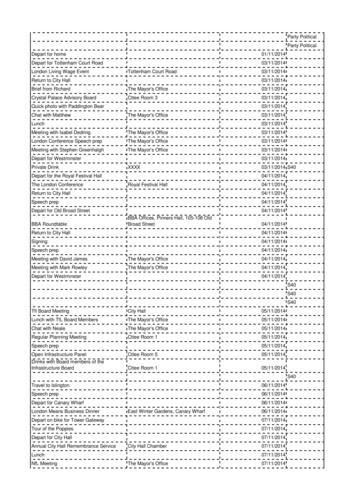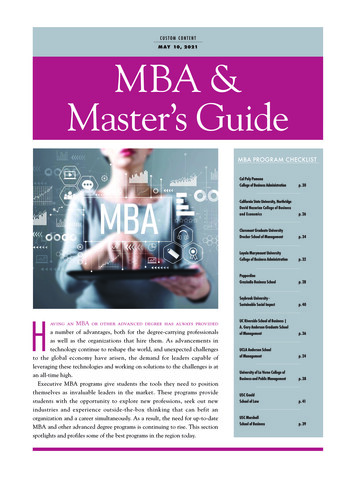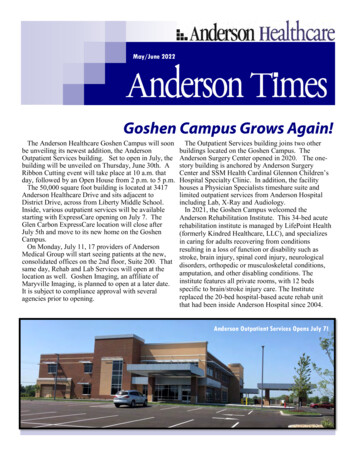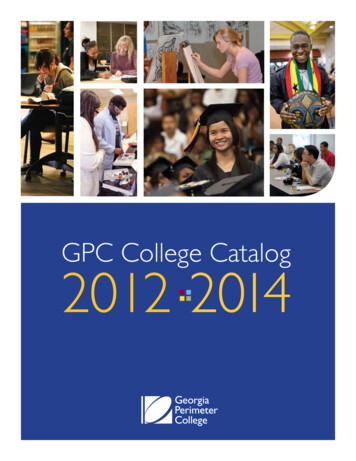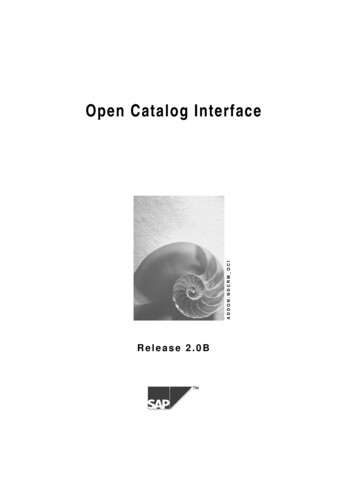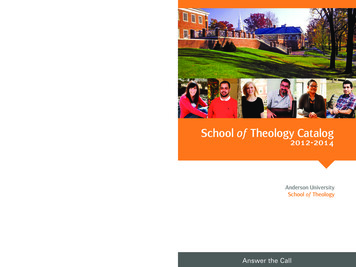
Transcription
School of Theology Catalog2012-2014School of Theology1100 E. 5th St., Anderson, IN 46012-3495800.428.6414 765.641.4526www.anderson.edu/sotAnderson UniversitySchool of Theology Answer the Call
CATALOG 2012-20141100 E. 5th St., Anderson, IN 46012-3495Toll Free (800) 428-6414 Local (765) 641-4526www.anderson.edu/sot
Table of ContentsAdministration and Faculty. 4Institutional Goals and Relationships. 7Facilities. 10Campus Map. 14Faculty and Student Organizations. 15Pre-Seminary Education. 16Admission Requirements and Procedures. 17Tuition and Fees. 19Student Life Policies. 20Scholarships and Financial Aid . 20Degree Programs. 22Doctor of Ministry. 23Master of Divinity. 25Master of Theological Studies. 27Online Master of Arts in Christian Ministry. 29Master of Arts in Intercultural Service. 31Theological Field Education. 32Harp Professor in Residence. 33Center for Christian Leadership. 34Academic Policies. 34Course Descriptions. 38Doctor of Ministry (DMIN) Courses. 39Master’s Degree Courses. 41Biblical Studies (BIST). 41Historical and Intercultural Studies (HCUS). 43Pastoral Studies (PAST). 45Theological Field Education (THFE). 48Theological and Philosophical Studies (THST). 49Appendices. 51We Believe. 51Academic Calendar. 55Index. 56The material contained in the Anderson University School of Theology Catalog is for information only and does notconstitute a contract between the student and the university. The catalog provides an overview of course offeringsand content. It is not the official list of offerings for any given term. Students should consult the course schedulefor the specific term(s) for which they wish to register. The university and its various units reserve the right to revise,amend, alter, and change from time to time its policies, rules, regulations, and financial charges including those relatedto admission, instruction, and graduation, without notice to students. The university reserves the right to withdrawcurricula and specific courses, alter course content, change the calendar, and withdraw or change programs and majorsoffered by the university without notice to students.Anderson University is a not-for-profit exempt organization as described in Section 501(c) (3) of the Internal RevenueCode. In compliance with the Civil Rights Act of 1964 and 1991, and Title IX of the Educational Amendments of1972, the university does not discriminate on the basis of race, color, national origin, age, sex, or veteran status in itspolicies, practices, or procedures. In compliance with Section 504 of the Rehabilitation Act of 1973 and the Americanswith Disabilities Act of 1990 as amended, the university does not discriminate on the basis of disability in its educationalprograms, admissions procedures, and employment practices. In compliance with the Personal Responsibility and WorkOpportunity Reconciliation Act of 1996, the university reports to the State of Indiana required information on newlyhired employees. The university maintains compliance with the Occupational Safety and Health Act of 1970, the DrugFree Schools and Communities Act of 1989, the Drug Free Workplace Act of 1988, the Family Educational Rights andPrivacy Act, and the Health Insurance Protection and Portability Act.Students who may need disability services can contact Disability Services for Students (part of the Kissinger LearningCenter) at 765-641-4225 or visit www.anderson.edu/kissinger/dss.html.
We live in a brokenworld. Brokenness is pervasive. Itshows up in personal relationships butalso in political and religious systems.Some have given up hope. Still othershave turned to cynicism and despair.Is there a way forward? In the midstof all the hand wringing of a worldgone wrong we see God at work inthe emerging culture. It appears thatold ways of thinking and behaving arebeing shaken to the core and new waysof living and relating are being born. We believe God, at this point in human history, is doing a new thing and is inviting us to become reconcilers in a broken world.The mission of Anderson University School of Theology is to form women and menfor the ministry of biblical reconciliation. We celebrate an equality of women andmen called to ministry. We affirm with scripture that sin, both personal and social,separates us from God and each other. Therefore we embrace the message of thecross and proclaim in word and deed that Jesus is making all things new.If you are interested in joining God in doing a new thing for a new day, I invite youto consider pursuing graduate studies at Anderson University School of Theology.For over 60 years we have been a place where scholarship, spirituality and service areoffered to the glory of God. The seminary community is enriched by the broaderrepresentation of the body of Christ in the student body.Today seminary students come to us to prepare for congregational leadership,cross-cultural service, chaplaincy, and teaching in higher education. Still othersjoin us to deepen their own spiritual formation and theological understanding.Whatever your calling we desire to come alongside and help you define and refineyour God-given gifts.David L. SebastianDean of the School of TheologyAnderson University School of Theology Catalog, 2012-20143
Administration and FacultyADMINISTRATIVE OFFICERSJames L. EdwardsPresidentMarie MorrisProvostRobert L. CoffmanVice President forAdvancementBrent A. BakerVice President for StudentAffairsDavid L. SebastianDean of the School ofTheologyDana S. StuartVice President for Financeand TreasurerTRUSTEESThe School of Theology is a graduate school of Anderson University. The executive officers, the boardof trustees, and the executive committee are the same as those currently listed in the Anderson UniversityUndergraduate Catalog. The board of trustees of the university comprises 32 members. Six or seven areelected each year by the remaining members and then ratified by the General Assembly of the Church ofGod. A School of Theology committee, composed of six trustee members, gives governing oversight to theSchool of Theology program.FACULTYDate in brackets indicates year of first appointment to the School of Theology faculty.James L. EdwardsPresident of the UniversityB.A., Anderson University; M.Div.,Anderson University School ofTheology; Ph.D., Ohio StateUniversity. [President since 1990]David L. SebastianDean of the School of TheologyB.A., Warner Southern College;M.A., Anderson University School ofTheology; M.Div. studies, D.Min.,Fuller Theological Seminary.[Dean since 1995] JohnH. AukermanProfessor of Christian Education;Director of Distance Education andOutcomes AssessmentB.A., Anderson University; M.Div.,Anderson University School ofTheology; M.S., Marshall University;Ed.D., Ball State University. [1984]4Guy R. BrewerAssociate Professor ofPastoral TheologyB.S., Vanderbilt University; M.Div.,Emory University; D.Min., AsburyTheological Seminary; Ph.D., OxfordUniversity, Graduate TheologicalFoundation. [2006]MaryAnn HawkinsProfessor ofIntercultural StudiesB.S., Bartlesville Wesleyan College;M.A., Azusa Pacific University; Ph.D.,Fuller Theological Seminary. [2006]James W. LewisProfessor of Theology and Ethics;Associate DeanB.S., M.B.A., Texas A&M University;professional studies, NorthwesternUniversity; M.Div. studies,Southwestern Baptist TheologicalSeminary; Ph.D., Duke University.[1992]Anderson University School of Theology Catalog, 2012-2014
Administration and Faculty, continuedKimberly S. MajeskiAssistant Professor of BibleB.A., Cumberland University; M.Div.,D.Min., Anderson University Schoolof Theology. [2008]Gilbert LozanoAssociate Professor of Biblical StudiesB.Th. Boa Terra Theological Institute;B.A. Warner Pacific College; M.Div.The Iliff School of Theology; Ph.D.University of Denver and The IliffSchool of Theology. [2011]G. Alan OverstreetChair, Dept. of Religious Studies;Assistant Professor of ChristianEducation/MinistryB.A., Mid-America ChristianUniversity; M.Div., AndersonUniversity School of Theology; D.Min.,Christian Theological Seminary. [2006]Gregory A. RobertsonAssociate Professorof Christian TheologyB.A., Gulf Coast Bible College; M.Div.,Southwestern Baptist TheologicalSeminary; Th.M., PrincetonTheological Seminary; Th.D., WycliffeCollege, University of Toronto [2005]Associate FacultyFredrick W. BurnettProfessor of ReligionL. Spencer SpauldingAssociate Professor of Bibleand ReligionB.A., Anderson University; M.Div.,Anderson University School ofTheology; D.Min., Ph.D., VanderbiltUniversity.B.A., Anderson University; M.Div.,Anderson University School ofTheology.Willard K. Reed, Jr.Professor of PhilosophyMerle D. StregeProfessor of Historical TheologyB.S., Arlington College; M.Div.,Anderson University School ofTheology; D.Min., School of Theologyat Claremont; M.A., Ph.D., ClaremontGraduate School.B.A., Anderson University; M.Div.,Anderson University Schoolof Theology; Th.D., GraduateTheological Union.Fredrick H. ShivelyProfessor of ReligionB.A., Anderson University; M.Div.,D.Min., Fuller Theological Seminary.ADJUNCT FACULTYGary Agee,Ph.D.Church HistoryRobert Branson,Ph.D.Biblical StudiesAnderson University School of Theology Catalog, 2012-2014Glendon Cox,D.Min.Pastoral Care andCounseling5
Administration and Faculty, continuedfaculty emeritiBarry L. Callen, D.Rel., Ed.D.University Professor Emeritus ofChristian Studies since 2005Kenneth F. Hall, D.Min.Professor Emeritus of ChristianEducation since 1992Robert A. Nicholson, Ph.D.,L.H.D., L.L.D.President Emeritus since 1990Walter Froese, Ph.D.Professor Emeritus of ChurchHistory since 2007Juanita Evans Leonard, Ph.D.Professor Emerita of ChristianMission since 2006Theodore A. Stoneberg, Ph.D.Professor Emeritus of Pastoral Caresince 2006Dwight L. Grubbs, D.Min.Professor Emeritus of AppliedTheology since 1995James Earl Massey, D.Div.,D.D., Hum.D., Litt.D.Dean Emeritus and DistinguishedProfessor-at-Large since 1995Douglas E. Welch, D.Miss.Professor Emeritus of ChristianMission since 1999Jerry C. Grubbs, Ed.D.Professor Emeritus of ChristianEducation since 2001program directorsJohn H.AukermanDirector ofDistanceEducationand OutcomesAssessmentMaryAnnHawkinsDean of ChapelDavid NeidertDirectorof StudentDevelopmentJames W. LewisDirector, Doctorof MinistryProgramGuy R. BrewerDirector ofTheological FieldEducationADMINISTRATIVE STAFFKristen CaylorAdministrative Secretary to the Deanand Dean of the ChapelShelly ShortAdministrative Assistant to theAssociate Dean and FacultyMaureen LyonAdministrative Assistant for StudentDevelopment6Anderson University School of Theology Catalog, 2012-2014
Institutional Goals and RelationshipsHISTORICAL PERSPECTIVEAnderson University was established in 1917 as Anderson Bible Training School. The institution’s history and development, which led to its university status, established the school’s importance in Christianhigher education in America. The School of Theology is part of that development. In 1950, a graduate division was established for the advanced professional preparation of ministerial students. This division is known asAnderson University School of Theology and is the graduate seminary of the Church of God (Anderson, Ind.).Anderson University School of Theology affirms its relationship with both its parent university andthe reform movement known within the Christian community as the Church of God (Anderson, Ind.). Asthe graduate seminary of the Church of God, Anderson University School of Theology is committed to thebiblical essentials of Christian holiness and Church unity, which have been hallmarks of the movement’smessage for more than a century. Honoring the entire Christian heritage, Anderson University School ofTheology aspires to be biblical in orientation, missional in emphasis, and relational in spirit.Anderson University School of Theology achieved full accreditation by the Association of TheologicalSchools in 1965. It has continued to maintain that status and has been granted accreditation to grant theprofessional doctoral degree by the Higher Learning Commission, North Central Association (www.ncahigherlearningcommission.org; phone: (312) 263-0456. Membership is also held in several other organizationsdevoted to quality education.Statement of Educational EffectivenessThe Anderson University School of Theology measures its educational effectivenessthrough our assessment of outcomes of learning. For detail on the seminary’s assessment, seethe link at edited by the Commission on Accrediting of the Association of Theological Schools in the UnitedStates and Canada, and the following degree programs are approved: MDiv, MA in Christian Ministry, MAin Intercultural Service, MTS, DMin.Approved for a Comprehensive Distance Education ProgramFor more information on the Association of Theological Schools, call (412) 788-6505, visit their website at www.ats.edu, fax (412) 788-6510, or mail the address below.The Commission on Accrediting of the Association of Theological Schools in the United States and Canada10 Summit Park DrivePittsburgh, PA 15275In the beginning: Robert H. Reardon’s vision for the School of TheologyAs assistant to Anderson University President John A. Morrison in the late1940s, Robert H. Reardon was a strong advocate for the establishment of aChurch of God seminary in Anderson, Ind. In 1950, the vision became realitywith the founding of the new Anderson School of Theology. Reardon was acharter member of the graduate faculty, and along with others, he contributedmany books from his personal collection to start the seminary library.— Robert Reardon was president of Anderson University from 1958 to 1983.Anderson University School of Theology Catalog, 2012-20147
Institutional Goals and Relationships, continuedINSTITUTIONAL GOVERNANCEAnderson University is governed by a board of trustees whose members are elected to five-year termsand ratified by the General Assembly of the Church of God. The president of the institution is accountableto this board for general administration of the university and seminary, including their development, maintenance, and programs. The president of the university is ratified by the General Assembly for five-year terms.An executive committee — consisting of the president and seven trustees elected by the board — actson behalf of the full university board between its scheduled meetings. The dean of the School of Theologyparticipates in meetings of the board. A six-member School of Theology committee of the board gives particular attention to the policies, personnel, and programs of the School of Theology.The faculty of the School of Theology operates under a grant of powers by the trustees and theadministration. Within the spirit and intent of stated seminary objectives, the faculty is responsible formaintaining the academic programs of the seminary at their maximum effectiveness.INSTITUTIONAL FOCUSThe School of Theology is a community dedicated to scholarship, spirituality, and service. The scholarship emphasis seeks to encourage and equip individuals in their quest for knowledge of the content andmeaning of the Scriptures and the historical development of the Christian church and its faith, always promoting academic excellence in the pursuit of truth. The emphasis on spirituality facilitates spiritual growth,the formation of distinct Christian values, and the integration of self within the pattern of a godly life thatmakes ministry meaningful and honest. The service emphasis encourages active participation in ministryand sharing, imperative for Christian life and witness.The mission of the Anderson UniversitySchool of TheologyForming women and men for the ministry ofBiblical reconciliationIn a context such as Anderson University School ofTheology, it is important to foster the development of a lifestyle of inclusion and to use inclusive language, where appropriate, rather than exclusive language. (See “Covenant to UseInclusive Language” in the School of Theology Student Handbook.)Raising leaders: James Earl Massey on training ministers for service to a needy worldWith students coming from diverse backgrounds, we needed not only to maintain the ethos of our movement’s life, but to share it with them. We not onlyneeded to prepare competent leaders for churches, but to help our students bereceived as creative and credible moral voices in a society woefully lacking inintegrity and a sense of values. We realized we could help them best throughaccenting scholarship, spirituality, and service.— James Earl Massey, dean of the seminary from 1989 to 1995.8Anderson University School of Theology Catalog, 2012-2014
Institutional Goals and Relationships, continuedINSTITUTIONAL RELATIONSHIPSFormal Institutional Memberships Association for Doctor of Ministry Education (ADME) Association for Theological Field Education (ATFE) Association of Theological Schools (ATS) American Theological Library Association (ATLA) Association for Clinical Pastoral Education (ACPE) Jerusalem University College Higher Learning Commission, North Central Association (HLC)Agencies Cooperating With Seminary Curricular Endeavors Anderson University (Anderson, Ind.) Church of God Ministries, Inc. (Anderson, Ind.) Fellowship of Evangelical Seminary Presidents The LOGOS Ministry (Pittsburgh, Pa.) Seminary Consortium for Urban Pastoral EducationThe big picture: Building scholars of integrity in the context of community lifeThe faculty and staff of the School of Theology are committed to the development of servant leaders inthe fulfillment of the biblical mandate to follow Jesus Christ into all the world. We value the uncoveringof what this means within the postmodern context of our society and world. The spiritual formation ofmen and women is a central focus of the integration and preparation of ministerial students toward thatend. Whether preparing for service as pastors of local congregations, leaders within churches, or as crosscultural mission personnel, an informed scholar of integrity is our intent. The School of Theology valuesspiritual formation as a central integration point of preparation for ministry. This integration complements the academic disciplines. Students and faculty are encouraged to share together in the communitylife of faith through chapel attendance, small prayer groups, spiritual formation groups, and personalmeditation. Active participation in the life of a local congregation is also highly desirable.Anderson University School of Theology Catalog, 2012-20149
FacilitiesYork seminary villageThe York Seminary Village provides apartment-style housing for School of Theology students. Thisnew complex, completed in two phases during 2006 and 2007, contains eight buildings with a total of 18individual living units.These units, within walking distance of the seminary building, provide standard amenities, includingtwo parking spaces for each unit; wired and wireless Internet access provided through the university’s computer network; cable television access, which residents must pay for if they choose to order it; refrigerator,stove, dishwasher, in-sink garbage disposal, “instant hot water” faucet, washer and dryer, and central airconditioning; telephone service with voice mail provided; all-electric/no gas (residents required to pay theirown electric bills); and water and sewage bills paid by the university.Available floor plans include: one-bedroom unit (530 square feet; four units available) for one student, a single parent withone pre-teen child, or a married couple. two-bedroom unit (1,050 or 1,260 square feet; three units available) for two samegender single students, a single parent with children, or a married couple with children. three-bedroom unit (1,280 or 1,500 square feet; four units available) for three same-gendersingle students, a single parent with children, or a married couple with children.To apply for housing in York Seminary Village, students must complete a housing reservationform. Forms are available in the Office of Students Development at the School of Theology, or onlineat www.anderson.edu/sot. To request a form by mail, contact the student development office, AndersonUniversity School of Theology, 1100 E. 5th St., Anderson IN, 46012. You may also request a form bye-mail to dlneidert@anderson.edu or by phone at (765) 641-4526.10Anderson University School of Theology Catalog, 2012-2014
Facilities, continuedThe School of Theology BuildingThe School of Theology building was constructed in 1961 and extensively remodeled in 1974. In 1989,the School of Theology was connected to the Robert A. Nicholson University Library. In 2009 an extensiveupgrade of the building was completed. The School of Theology building houses administration and facultyoffices, classrooms, a student lounge, and other facilities important to the educational environment. Adam W. Miller Chapel: The Adam W. Miller Chapel opened in 1974 as a sanctuary for the worship of God. It provides a functional worship context for seminary training with spiritual insight aswell as academic rigor. Chapel is held weekly throughout the academic year in this facility. Robert A. Nicholson University Library: The former undergraduate Wilson Library and theSchool of Theology Byrd Library were combined in 1989 to create the Robert A. NicholsonUniversity Library, an extensive resource in ministerial educaton with collections directlysupporting graduate theological programs. The library holds membership in the AmericanTheological Library Association (ATLA) and the Indiana Cooperative Library Services Authority(INCOLSA) and participates in Online Computer Library Center (OCLC), a nationally sharedbibliographic data network. The School of Theology is physically connected to the library. Church of God Archives: The archives of the Church of God (Anderson, Ind.), together withthe archives of Anderson University and Charles E. Wilson, are housed in a separate area withinthe Robert A. Nicholson Library. The Church of God archives provide a resource for ministersand scholars researching the heritage of the Church of God. Gustav Jeeninga Museum of Bible and Near Eastern Studies: This teaching museum housesa large collection of artifacts from ancient Near Eastern cultures. The museum exhibits artifactsranging from 3000 BCE to 200 CE. These exhibits consist of authentic pieces, such as cuneiform texts, pottery, seals, and coins, and replicas of major artifacts, including the ShalmenesarObelisk, Mesha Stele, Hammurabi Law Code, Rosetta Stone, Sennecherib Prism, GilgameshEpic, and the Siloam Inscription. The museum displays a large collection of authentic potteryfrom the Bronze Age settlement of Bad edh-Dhra, located in modern-day Jordan. Computer Lab: A computer lab is available for the exclusive use of School of Theology students.Internet and online services, along with the full package of software, provide students with upto-date technical services. B.E. Warren Lounge: Warren Lounge provides students a cozy place for fellowship, studying,and relaxing between classes. The lounge has a kitchen for seminary use.Anderson University School of Theology Catalog, 2012-201411
Facilities, continued ANDERSON UNIVERsiTY FACILITIESThe School of Theology benefits from being part of Anderson University. Through this relationship, our students may make full use of Anderson University’s extensive educational services andrecreational facilities. These include the Kardatzke Wellness Center, lounges, swimming pool, tenniscourts, gymnasium, athletic field and track, Center for Educational Technology, Kissinger LearningCenter, Reardon Auditorium for the performing arts, post office, bookstore, Olt Student Center,snack bar, the Krannert Fine Arts Center, Byrum Hall for theatrical presentation, and many otherservices and facilities.Residential Facilities for Undergraduate Students Dunn Hall: Completed in 1954, renovated in 1999; houses 190 men. Martin Hall: Completed in 1958, renovated in 2008; houses 183 women. Morrison Hall: Completed in 1949, renovated in 2007; houses 183 women. Myers Hall: Completed in 1970; houses 112 men and women. Rice Hall: Completed in 1966; houses 234 women. Smith Hall: Completed in 1964, renovated in 2008; houses 205 men. South Campus/Tara East/Fair Commons: Apartment-style living forjunior and senior undergraduate students.Academic/Administrative Facilities Broadcasting Center: Houses Covenant Productions, WQME, production rooms, a TVstudio, editing bays, offices, and class labs. Decker Hall: Completed in 1970, expanded in 1994; houses classrooms, faculty, andadministrative offices, Information Technology Services, the Mail Distribution Center,Café Olé, the Center for Educational Technology, the Department of Student Life, andseveral other offices and departments. Welcome Center: Completed in 1994 as an expansion of Decker Hall; houses theOffice of Admissions, Student Financial Services, and the Registrar’s Office. Hardacre Hall: Dedicated in 2001; houses Falls School of Business, the School of AdultLearning, Police/Security Services, and Physical Plant. Hartung Hall: Opened in 1964, renovated and expanded in 1993; houses classrooms,laboratories, faculty offices, and a lecture hall. Krannert Fine Arts Center: Completed in 1979; houses the Department of Art andDesign, the School of Music, the College of the Arts, the Wilson Art Galleries, classrooms, laboratories, practice and rehearsal rooms, recital venues, a MIDI lab, a recordingstudio, faculty studios, and a listening center. Flagship Education Center: Completed in 2007; houses offices and classrooms ofthe School of Adult Learning and the Falls School of Business, graduate classes ofthe School of Education, the Professional Development Center, AU’s residentialMBA students, and Purdue College of Technology at Anderson. Located off I-69,exit 22.Recreational Facilities Athletic Complex: Includes Macholtz Stadium, Raven Park (baseball), softball field, andtennis courts.12Anderson University School of Theology Catalog, 2012-2014
Facilities, continued Bennett Natatorium: Completed in 1972, connected to Kardatzke Wellness Center in2002; houses a six-lane collegiate-size pool and men’s and women’s locker areas. O.C. Lewis Gymnasium: Completed in 1962, connected to Kardatzke WellnessCenter in 2002, renovated in 2004; houses intercollegiate athletic facilities for men’sand women’s basketball and volleyball. Kardatzke Wellness Center: Completed and connected to O. C. Lewis Gymnasiumand Bennett Natatorium in 2002; houses a large fieldhouse, weight room, fitness center, indoor tracks, athletic training facilities, classrooms, intercollegiate athletics offices,and the Department of Kinesiology. The Wellness Center also serves as the venue forcommencement exercises. Soccer Field: Home of the Raven men’s and women’s soccer teams. Olt Student Center: Completed in 1963; houses the Marketplace, Raven’s Haven,Mocha Joe’s, the Corner Pocket, private dining rooms, the bookstore, student government offices, and the Office of Stu dent Activities.Auditoriums/Performance Facilities Byrum Hall: Completed in 1908, renovated in 1974; a campus landmark once usedfor basketball games and physical education classes; houses a 530-seat prosceniumtheatre. Reardon Auditorium: Completed in 1983; seats 2,200; used
Anderson University School of Theology Catalog, 2012-2014 7 As assistant to Anderson University President John A. Morrison in the late 1940s, Robert H. Reardon was a strong advocate for the establishment of a Church of God seminary in Anderson, Ind. In 1950, the vision became reality with the founding of the new Anderson School of Theology.
